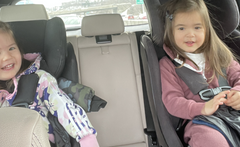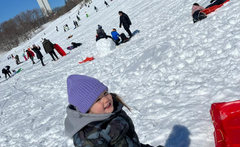
Your baby is halfway to a year already! She's realizing that there’s a fascinating world out there waiting to be explored. And as your baby's personality begins to emerge, you'll be admiring her laughter, giggles, and curiosity every day. For her, each new day has new surprises and new accomplishments.
Your baby will be much better able to communicate her emotions and desires now, and she'll voice them A LOT. She'll also have different cries for different wants and needs.
Your baby is continuing to learn and develop so much in all domains of development, including social/emotional, language/communication, cognitive (learning, thinking, problem-solving), movement, and sensory. Keep reading to learn more about milestones that most babies are reaching at 6 months.
Keep in Mind
Keep in mind that the actual age when a typically developing child reaches a milestone really can vary. Each child develops in their own unique way, so there's no need to worry unnecessarily if your child isn't hitting a milestone right away, especially if your child is hitting most milestones in other domains.
That being said, you are your child's best advocate. If there is an issue, it's always best to act early, so if you have any concerns about your child's development, please speak with your pediatrician.
Social and Emotional Milestones

Your baby may enter a normal developmental stage known as stranger anxiety. Or as we like to call it, stranger danger. Your six-month-old may occasionally cry when you leave the room or when he's confronted by a stranger. This is because he's developing a strong attachment for you. This is a normal and healthy sign that he's associating you with his own well-being and that he can distinguish you from other people.
However, your child will probably also go through a period of smiling and playing with everyone he meets. His personality will be coming out in full bloom, and even those meeting him for the first time will notice many of his unique personality traits. You can take advantage of his sociability and introduce him to people who will help care for him in the future, like babysitters, relatives, and other childcare workers.
Many babies at this age:
- Know familiar faces and begins to know if someone is a stranger
- Like to play with others, especially parents
- Respond to other people’s emotions and often seems happy
- Like to look at self in a mirror
Language & Communication Milestones

Your baby is now better able to communicate her emotions and desires. She’ll cry not only when she’s hungry or uncomfortable, but also when she wants a different toy or change in activity.
Around this time, your baby will also start to recognize her own name and turn to you when you call her name. She'll also start to understand simple everyday words, such as "book" and "bottle."
Continue to encourage speech and comprehension by narrating your day and read books to your baby often. You can describe what you're doing during everyday activities (also called self-talk) and also narrate what your baby is doing (parallel-talk). When reading, label the names of objects and people in the book and use colours, textures and, sizes to describe them.
You can also teach turn taking in conversation by alternating between talking, listening to show interest in your baby's responses, and reacting to them.
Many babies at this age:
- Respond to sounds by making sounds
- String vowels together when babbling (“ah,” “eh,” “oh”)
- Begin to use consonant sounds in babbling (“da, da, da”)
- Like taking turns with parent while making sounds
- Respond to own name
- Make sounds to show joy and displeasure
- Listen and responds when spoken to
- Make different kinds of sounds to express feelings
Cognitive Milestones

During this period, your baby will likely make an important discovery: object permanence - the concept that when something disappears from his line of vision, it’s not gone for good. In his first few months, your baby assumed that the world consisted only of things that he could see. When you exited the room, you vanished. When you returned, you were a whole new person. When you hid an object under a blanket, he thought it was gone for good and wouldn’t bother looking for it.
Now, he’ll begin to realize that the world is more permanent than he realized. You’re the same person who greets him in the morning; his teddy bear on the floor is the same one that was in bed with him the night before.
By playing hiding games like peekaboo and observing people coming and going, your baby will continue to learn about object permanence for the months to come.
Many babies at this age:
- Can find partially hidden objects
- Notice toys that make sounds
- Show curiosity about things and tries to get things that are out of reach
Movement Milestones
At 6 months, your baby will start to use her fingers and thumbs together in a mitten or claw-like grip or raking motion, and she'll manage to pick up lots of things.
Pictured above, this 6-month-old is grasping Jenny & Andy's Organic Crinkle Toy. The pleasant crinkle noise and texture encourages babies to explore, grasp, and discover. At 6 months, he may even start to learn how to transfer objects from one hand to the other.
Many babies at this age:
- Begin to sit without support
- Roll from back to tummy and tummy to back
- When standing, support weight on legs and might bounce
- Start to push themselves up into a crawling position and may be able to rock back and forth on their hands and knees
Sensory Milestones

During this period, your baby is learning to coordinate his emerging perceptive abilities - primarily the use of vision, touch, and hearing.
Although there’s a lot of variability in timing, teething usually starts at this age as the first couple of teeth start to come in. Teething could occasionally cause mild irritability, crying, a low-grade temperature (but not over 101 degrees Farenheit or 38.3 degrees Celsius), excessive drooling, and an urge to chew on things. To ease your baby’s discomfort, you can try gently massaging the gums with one of your fingers and give him a toy that’s designed for teething.
Exclusive breastfeeding or bottle-feeding is recommended until six months. Now, at six months, you can start introducing solid foods. But if he starts to cry or turn away when you try to feed him, don’t force it. Go back to nursing or bottle-feeding for a week or two and then try again.
Many babies at this age:
- May be introduced to food
- May start teething if first teeth come in
- Able to identify the direction of sounds & recognize familiar words
- Have improved eye control, hand-eye coordination, and depth perception
- Are drawn to colours, patterns, and shapes of different objects and toys
- Are not upset by everyday sounds
Want a handy checklist all in one place?
Download our Comprehensive Developmental Milestones Checklist PDF for free ☑️!
Developmental Milestones By Age
Sources:
- American Academy of Pediatrics. Caring for Your Baby and Young Child, 7th Edition: Birth to Age 5, Fifth Edition. 2009
- Centers for Disease Control and Prevention. Important Milestones: Your Baby By Six Months, 19 Oct. 2021
-
Nemours Children's Health. Movement, Coordination, and Your 4- to 7-Month-Old, Jun. 2019.
-
Nemours Children's Health. Separation Anxiety, Oct. 2016
- What To Expect. When Do Babies Recognize and Respond to Their Name?, 27 Sept. 2021
- What To Expect. When Your Baby Will Start Babbling, 5 Oct. 2021




